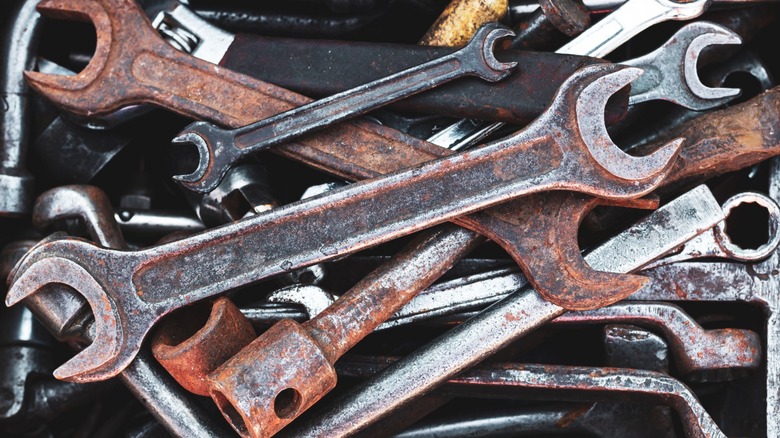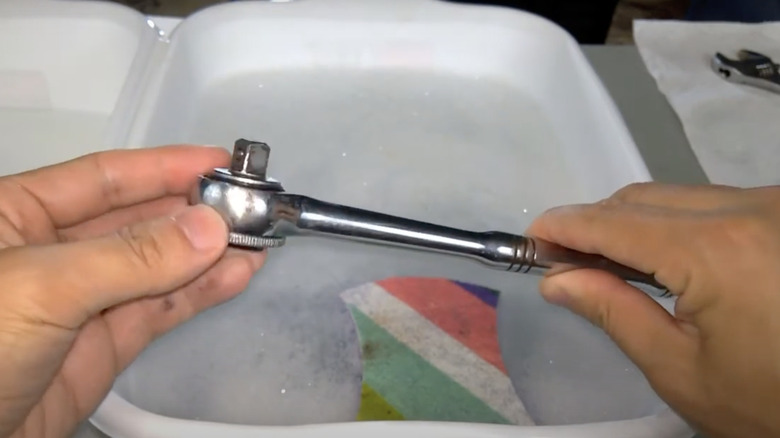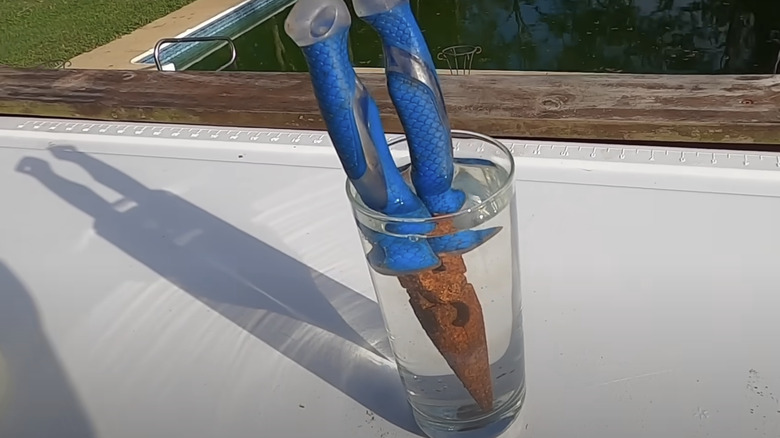Is Your Toolbox Filled With Rusty And Greasy Tools? Here's How To Remove Stubborn Gunk
Handling your home's next DIY or repair project will be kind of a bummer if your tools are looking a little lackluster. Letting rusty and greasy tools accumulate in your box will eventually compromise their quality and make them harder to use. So if you need to remove stubborn rust, grease, and general grime, get it done as soon as possible. For greasy tools, you will need some type of degreasing agent, like dish soap, and an abrasive component, like baking soda. For rusty ones, baking soda is also often used, but with the addition of an acid, like white vinegar.
Don't let the tools in your house become an afterthought. Regular use causes grease to build up, which won't go away unless you clean it periodically. Also, if you neglect to properly store your tools when you are not using them, you could be introducing moisture and oxygen that encourages rust to form. Try these simple solutions to get rid of rust or grease on wrenches, hammers, pliers, and more. Once you've mastered these cleaning methods, you can look out for the most valuable tools at garage sales and easily take them home for a thorough cleaning.
Best way to eliminate greasy gunk on tools
When it comes to grease, you probably already have everything you need at home to remove it. While keeping a healthy layer of oil (like WD-40) on your tools helps prevent the development of rust in between uses, a buildup of grease can be messy, unsightly, and even dangerous by making tools slippery. Regularly wiping them down after use is an easy way to keep things from getting out of hand. However, if it gets to be too much, eliminating it is easy with a detergent, such as a mild dish soap. You will also need a bucket with hot water, a scrub brush, and perhaps baking soda to serve as an abrasive agent.
Add a few drops of a degreasing dish soap to a bucket of hot water. Then add your dirty tools to this sudsy water. One by one, scrub the grease off every metal surface, using a sponge. To handle especially difficult buildup or hard-to-reach areas, consider using baking soda to better break down and scrub away the mess. If you still have trouble, look to other methods, like this clever hack that gets grease off of pans by using crumpled newspaper pages. Thoroughly rinse and dry your tools when done.
Method to get rid of rust on your tools easily
You might not realize it, but you can give your tools a much-needed clean with just a couple of baking essentials, including vinegar and baking soda. Rust, which develops due to the oxidation of metals, requires something acidic to break down. For common tools, like pliers and wrenches, a household acid, like white vinegar, will work well. You will also need a bucket or large tub to fill with hot water, plus baking soda or borax to scrub away uncooperative rust deposits.
If you have a lot of tools to clean, you can soak them all at once in a large tub or bucket. Start by filling your bucket with white vinegar and leave everything to soak. After sitting in vinegar for a few hours, remove them and scrub gently to get rid of any deposits. Rust that has been left for a long time can be difficult to displace without something to help rub it off, like a baking soda or borax paste. Using gloves, carefully mix ½ cup of baking soda with 1 cup of acid to create a paste. Apply this liberally over the tools, allow to dry, then scrub away the last remnants of rust for a refreshed look. If you would rather skip the baking soda, you can mix about ¼ cup salt per 4 cups of vinegar as your abrasive component.


